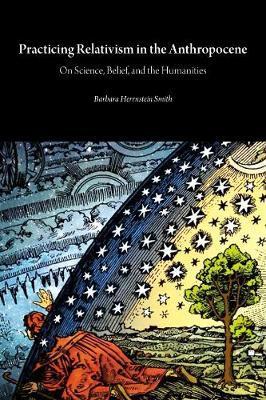Practicing Relativism in the Anthropocene: On Science, Belief, and the Humanities

Practicing Relativism in the Anthropocene: On Science, Belief, and the Humanities
In Practicing Relativism in the Anthropocene, Barbara Herrnstein Smith addresses a set of contemporary issues involving knowledge and science from a constructivist-pragmatist perspective often labeled "relativism." Practicing that relativism, she argues, does not mean refusing judgment or asserting absurdities but being conscious of the existence and significance of contingency, complexity, and multiplicity. Rejecting classic and neorealist views of knowledge and human cognition, Smith describes important alternative accounts in cognitive theory, science studies, and contemporary philosophy of mind. The "relativism" commonly associated with these alternative accounts, she maintains, is a chimera--part straw man, part red herring. Objections to the position so named typically involve crucially improper paraphrase of empirical observations of variability and contingency or dismaying inferences improperly drawn from such observations. In an extended examination of recent writings by Bruno Latour, Smith indicates the increasing centrality of theological investments in his work and both the interest of those writings but also their limits for humanities scholars seeking to appropriate them. Discussing computational methods in literary studies, she describes how the idea of "close reading" has operated historically in the Anglo-American literary academy and how it figures now in the discourses of the digital humanities. Efforts to make the aims and methods of the humanities more scientific, she suggests, typically involve ill-informed or otherwise dubious conceptions of science. What distinguishes the humanities and the natural sciences, she argues, are neither subject areas nor methods as such but fundamental epistemic orientations. Declining calls to reaffirm or rehabilitate philosophical realism in the face of denials of climate change, Smith maintains that the most illuminating perspectives for conceptualization and practice in the Anthropocene are precisely those labeled, but commonly mischaracterized as, "relativist."
PRP: 165.33 Lei
Acesta este Prețul Recomandat de Producător. Prețul de vânzare al produsului este afișat mai jos.
148.80Lei
148.80Lei
165.33 LeiLivrare in 2-4 saptamani
Descrierea produsului
In Practicing Relativism in the Anthropocene, Barbara Herrnstein Smith addresses a set of contemporary issues involving knowledge and science from a constructivist-pragmatist perspective often labeled "relativism." Practicing that relativism, she argues, does not mean refusing judgment or asserting absurdities but being conscious of the existence and significance of contingency, complexity, and multiplicity. Rejecting classic and neorealist views of knowledge and human cognition, Smith describes important alternative accounts in cognitive theory, science studies, and contemporary philosophy of mind. The "relativism" commonly associated with these alternative accounts, she maintains, is a chimera--part straw man, part red herring. Objections to the position so named typically involve crucially improper paraphrase of empirical observations of variability and contingency or dismaying inferences improperly drawn from such observations. In an extended examination of recent writings by Bruno Latour, Smith indicates the increasing centrality of theological investments in his work and both the interest of those writings but also their limits for humanities scholars seeking to appropriate them. Discussing computational methods in literary studies, she describes how the idea of "close reading" has operated historically in the Anglo-American literary academy and how it figures now in the discourses of the digital humanities. Efforts to make the aims and methods of the humanities more scientific, she suggests, typically involve ill-informed or otherwise dubious conceptions of science. What distinguishes the humanities and the natural sciences, she argues, are neither subject areas nor methods as such but fundamental epistemic orientations. Declining calls to reaffirm or rehabilitate philosophical realism in the face of denials of climate change, Smith maintains that the most illuminating perspectives for conceptualization and practice in the Anthropocene are precisely those labeled, but commonly mischaracterized as, "relativist."
Detaliile produsului










